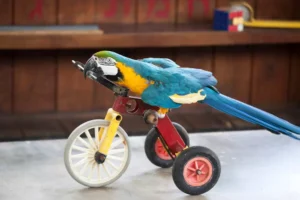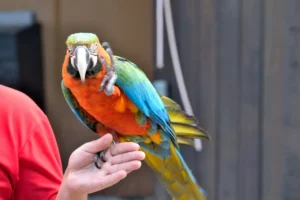Macaws are beautiful, intelligent birds that make great pets. They can be trained to do tricks, talk, and even come when called. If you’re thinking about getting a macaw, or have one already, here are a few tips on how to train your macaw.
First and foremost, it’s important to establish yourself as the leader of the flock. Macaws are very social creatures and need a strong leader to feel secure. When training your macaw, always keep this in mind and be consistent with your commands.
Second, use positive reinforcement whenever possible. Macaws respond well to rewards like treats or scratches behind the head. Never punish your macaw for bad behavior – this will only make them more likely to misbehave in the future.
Finally, have patience! Training a macaw takes time and patience. If you get frustrated or angry, take a break and try again later.
With some time and effort, you’ll be able to teach your macaw all sorts of fun tricks:
- Start with basic obedience commands such as sit, stay, come, and down. As your macaw becomes more comfortable with these commands, you can begin teaching tricks.
- Keep training sessions short and sweet, no more than 10 minutes at a time
- Macaws have a short attention span, so it’s important to keep things interesting
- Use positive reinforcement techniques such as treats or praise to encourage good behavior
- Avoid using negative reinforcement such as scolding or punishment, which can damage the bird’s trust in you
- Be patient! Training a macaw takes time and patience, but it will be worth it when you see your bird performing tricks for you!

How Do You Get a Macaw to Trust You?
If you want to build trust with a macaw, it is important to spend time with the bird and get to know its personality. Once you have established a rapport, you can begin working on training and handling exercises.
It is also critical to provide the macaw with a safe, secure environment where it feels comfortable.
With patience and consistency, you can develop a trusting relationship with your macaw.
How Do You Train a Macaw Not to Bite?
If you have a macaw that bites, you’re not alone. Macaws are known for their powerful beaks and can deliver a painful bite if they feel threatened or scared. But there are things you can do to train your macaw not to bite.
First, it’s important to understand why your macaw is biting in the first place. Is it feeling threatened or afraid? Or is it simply exploring its environment and trying to figure out what something is?
Once you know the reason behind the biting, you can begin to work on a training plan. Here are some tips for training your macaw not to bite:
- Establish trust and bond with your macaw. If your bird doesn’t feel comfortable with you, it will be more likely to lash out with its beak.
- Spend time every day interacting with your macaw positively, such as offering treats, playing games, or just sitting quietly together. This will help your bird feel more secure and less likely to bite.
- Don’t punish your macaw for biting. This will only make the problem worse and could cause your bird even more stress. Instead, calmly remove yourself from the situation and provide distraction elsewhere so that biting isn’t reinforced.
- Use positive reinforcement when your macaw refrains from biting. For example, offer a treat or verbal praise whenever it goes without biting for an extended period of time.
This will encourage desired behavior while also helping reduce any anxiety or frustration that could trigger biting episodes.
How Do You Discipline a Macaw?
There are a few things to consider when disciplining a macaw. The first is that macaws are very intelligent birds and can quickly learn what behaviors are acceptable and which ones are not.
Therefore, it is important to be consistent with your disciplinary actions.
If you only discipline your macaw occasionally, he will soon learn that he can get away with bad behavior some of the time.
It is also important to keep in mind that macaws are social creatures and need interaction with their human companions on a regular basis.
If you find yourself having to discipline your macaw often, it may be a sign that he is not getting enough attention from you.
Try to set aside some time each day for interactive play with your macaw. This will help him stay happy and well-behaved. When it comes to actually discipline your macaw, there are a few different options.
One is simply to scold him verbally when he does something wrong. Another is to spray him lightly with water from a plant mister or squirt gun whenever he misbehaves.
Some people also find it helpful to give their macaws short time-outs by placing them in their cages for a few minutes after they have acted inappropriately.
Whatever method you choose, make sure that you stay calm and consistent when disciplining your macaw.

How Do You Talk to a Macaw?
Assuming you would like tips on how to approach and talk to a macaw, here are a few things to keep in mind:
First, it is important to remember that macaws are very social creatures that love attention. So, when you first approach a macaw, it is important to do so with confidence and without any sudden movements.
Once you have the macaw’s attention, try offering it a treat as an incentive to come closer.
When talking to a macaw, it is important to use simple words and phrases that the bird can understand.
Macaws are also very good at imitating sounds, so if you make certain noises or expressions while talking to them, they will likely mimic these back to you.
Training a Scarlet Macaw To Be Less Nippy | THE BIRDIE BUBBLE
Macaw Training near Me
If you live in or near a major city, chances are good that there is a macaw training facility nearby.
Here are some things to consider when looking for a reputable macaw training center: – Does the center have experience working with macaws?
This is important, as macaws can be difficult to train. Make sure the staff has the knowledge and expertise necessary to help your bird succeed.
- What type of training methods does the center use? Positive reinforcement is often most effective with macaws, so look for a facility that uses this approach.
- What is the facility’s success rate? Ask around and see if anyone you know has had their macaw trained at the center you’re considering. If so, find out how the experience was and whether the bird made progress.
- How much does it cost? Training can be expensive, so make sure you know what the price includes before making any commitments.
Conclusion
Macaws are one of the most popular bird species kept as pets. They are known for their intelligence, playful personality, and vibrant plumage.
If you’re considering adding a macaw to your family, there are a few things you need to know about training them.
First, macaws require a lot of attention and interaction. They thrive on human companionship and will become bored if left alone for too long.
It’s important to set aside time each day to play with your macaw and provide mental stimulation through toys and puzzles.
Second, macaws are very active birds and need plenty of space to fly and explore. A large cage is essential, as it provides perches of different heights for climbing and jumping.
Macaws also love to chew, so make sure there are plenty of safe objects available for them to gnaw on.
Third, like all parrots, macaws can be loud at times. If you live in an apartment or in close quarters with your neighbors, this may not be the best pet choice for you.
However, with proper training, macaws can learn to vocalize only when necessary or when prompted by their owners.
With patience and consistency, any owner can successfully train their macaw’s tricks, behaviors, and manners. Just remember that these birds require a lot of time commitment and, care, but the rewards are definitely worth it!
